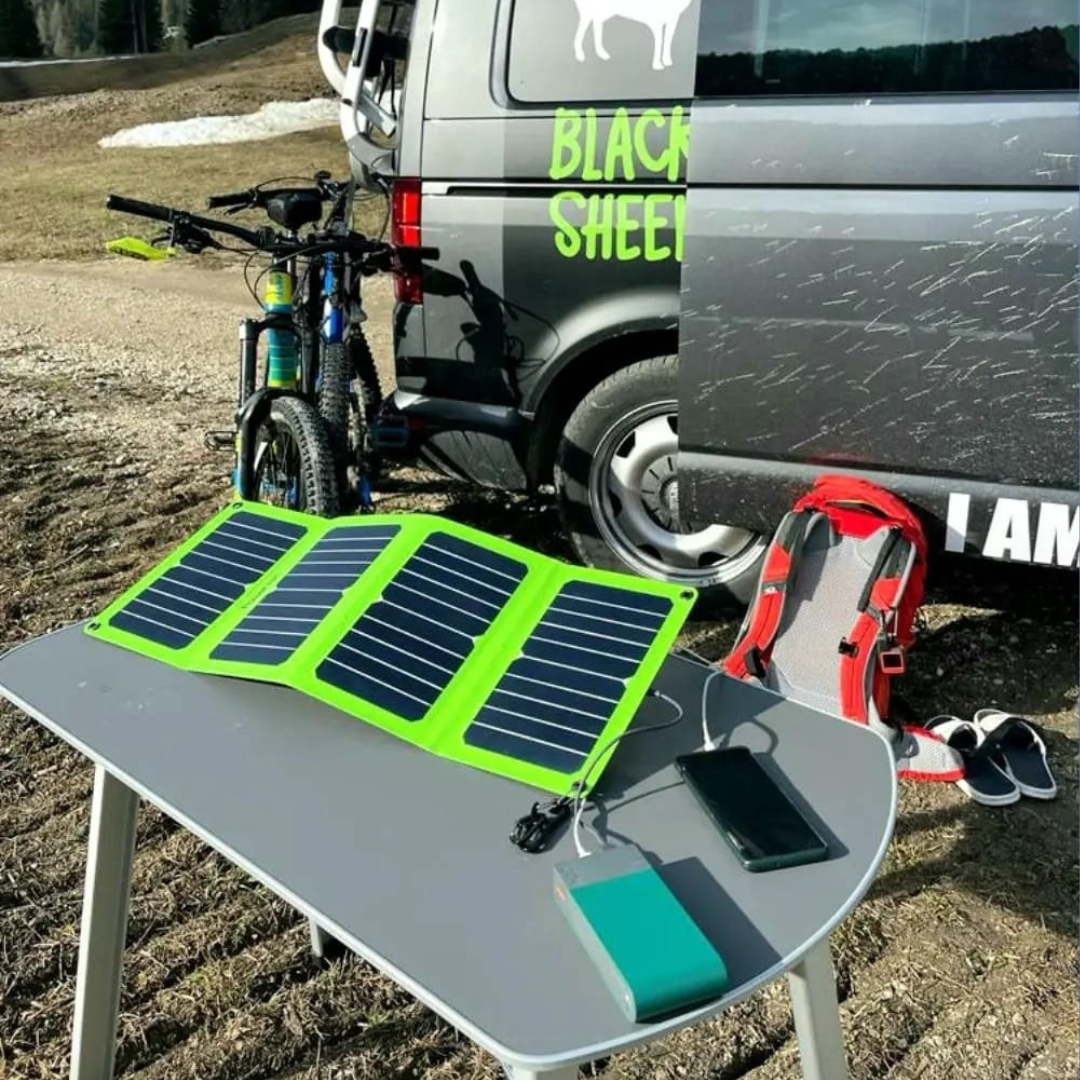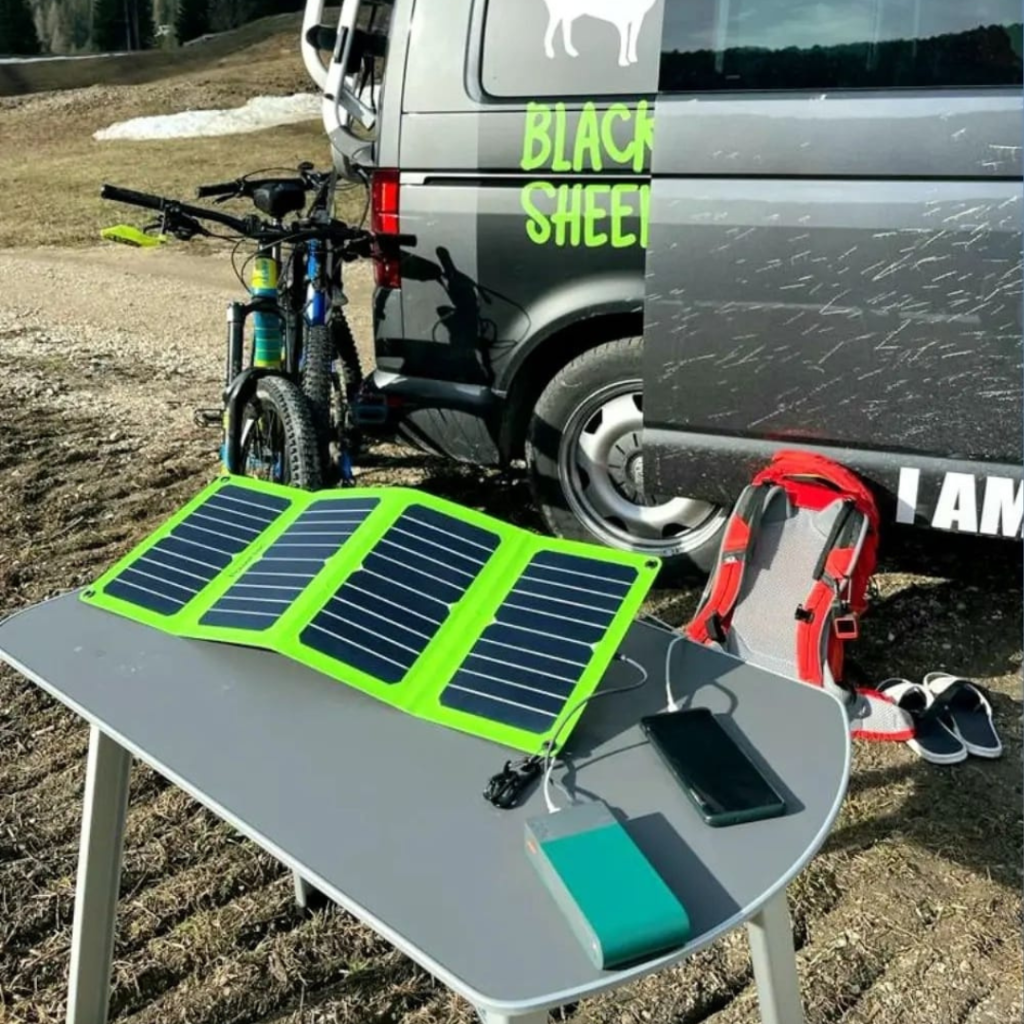Foldable solar panels represent a major technological advance in the field of renewable energy. Capable of converting sunlight into electricity in a more practical and adaptable way, they offer a multitude of possible applications, from homes to motorhomes to industrial applications.
What is a foldable solar panel?
A foldable solar panel is, as the name suggests, a photovoltaic device designed to be folded or rolled without compromising its functionality. These solar panels are generally made up of flexible photovoltaic cells, as opposed to the rigid cells used in traditional solar panels.
Flexible cells are lighter and more portable, making foldable solar panels a preferred choice for mobile or temporary applications. What’s more, the foldable nature of these panels means they can be adapted to a variety of surfaces and shapes, making them easier to install and optimising their exposure to the sun.
How do folding solar panels work?
Foldable solar panels work in much the same way as rigid solar panels. The photovoltaic cells capture sunlight and convert it into electrical current. However, the big difference lies in the ability of foldable solar panels to be moved and reoriented to maximise their exposure to the sun.
The power output of a foldable solar panel depends on a number of factors, including the quality of the photovoltaic cells, the surface area of the panel and the intensity of the sunlight. For example, a high-quality folding solar panel with a surface area of 2 m² can generate around 300 watts per hour in full sunlight.
What are the advantages of foldable solar panels?
Foldable solar panels offer many advantages in terms of convenience, efficiency and flexibility. These include
Portability: Foldable solar panels are generally lightweight and easy to transport. They can be packed into a rucksack or the boot of a car, making them ideal for camping or other outdoor activities.
Flexibility: Thanks to their flexible design, these panels can be installed on a variety of surfaces, even irregular or curved ones.
Easy installation: They are usually delivered with USB , USB-C or DC5521 ports that makes them immediately plug-and-play.
Durability: Despite their flexibility, foldable solar panels are robust and stand up well to outdoor conditions.
Where can foldable solar panels be used?
Foldable solar panels can be used in many situations where solar energy is needed but where portability and flexibility are also important. They are particularly useful for :
Camping: These panels can provide the energy needed to power camping equipment such as lights, fridges or phone chargers.
Boats: Thanks to their flexibility, they can be installed on the curved roof of a boat.
Recreational vehicles: They can be used to recharge the batteries in a motor home during a trip.
Emergencies: In the event of a power cut or natural disaster, these panels can provide a valuable source of energy.
How do I choose a folding solar panel?
The choice of a folding solar panel depends on a number of factors, such as the power required, the budget available, the weight and the size of the panel. It’s also important to check the quality of the photovoltaic cells and the panel’s durability. Prior research and comparisons between different models can help you make the best choice.
The Powertec portable solar panel
Powertec’s innovative solar technology is changing the way you enjoy your outdoor activities. Our practical, high-performance and eco-friendly portable solar panels power all your electronic devices on your adventures.
Lightweight and easy to use, they meet a variety of needs: charging electronic devices, powering hiking equipment, managing emergencies or expeditions to remote areas. In short, these panels make for a more flexible and environmentally-friendly outdoor experience.
FAQ
1. How many solar panels are needed to run a fridge?
To calculate the number of solar panels you need, it’s essential to know your fridge’s energy consumption. For example, the average domestic fridge consumes around 150 to 200 watts per hour. Assuming that your fridge runs 24 hours a day (which is unlikely, as fridges go into standby once the ideal temperature has been reached), you would need around 3,600 to 4,800 watts of solar energy per day.
In general, a 300-watt solar panel generates an average of 1.2 kilowatts of energy in 4 hours of optimal sunlight. To generate enough energy to run your fridge all day, you would need 3 to 4 * 300-watt solar panels, assuming 4 hours of sunshine.



